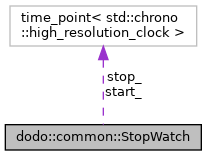dodo::common::StopWatch Class Reference
StopWatch timing class. More...
#include <util.hpp>
Collaboration diagram for dodo::common::StopWatch:

Public Member Functions | |
| StopWatch () | |
| Construct a StopWatch. More... | |
| double | getElapsedSeconds () const |
| Return the number of seconds between. More... | |
| double | restart () |
| Stop the stopwatch, start the Stopwatch again and return the elapsed time since previous start. More... | |
| void | start () |
| Start the stopwatch. More... | |
| double | stop () |
| Stop the stopwatch. More... | |
Private Attributes | |
| std::chrono::time_point< std::chrono::high_resolution_clock > | start_ |
| Start time. More... | |
| std::chrono::time_point< std::chrono::high_resolution_clock > | stop_ |
| Stop time. More... | |
Detailed Description
StopWatch timing class.
Constructor & Destructor Documentation
◆ StopWatch()
|
inline |
Member Function Documentation
◆ getElapsedSeconds()
|
inline |
◆ restart()
|
inline |
◆ start()
|
inline |
◆ stop()
|
inline |
Stop the stopwatch.
- Returns
- the elapsed time in seconds.
Definition at line 78 of file util.hpp.
References getElapsedSeconds(), and stop_.
Referenced by restart().
Here is the call graph for this function:

Here is the caller graph for this function:

Field Documentation
◆ start_
|
private |
Start time.
Definition at line 101 of file util.hpp.
Referenced by getElapsedSeconds(), start(), and StopWatch().
◆ stop_
|
private |
Stop time.
Definition at line 107 of file util.hpp.
Referenced by getElapsedSeconds(), start(), stop(), and StopWatch().
The documentation for this class was generated from the following file:
- src/include/common/util.hpp



